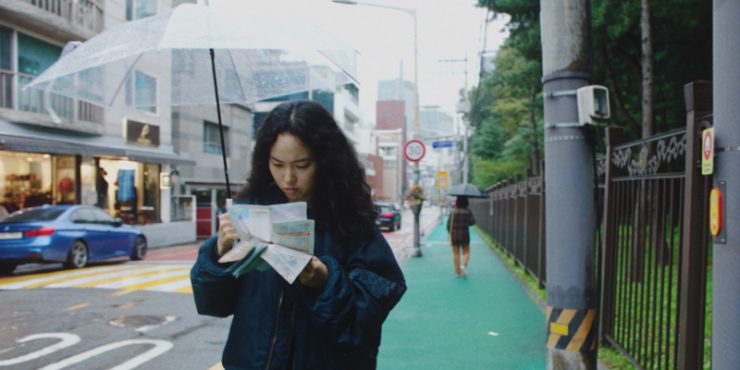When Walt Whitman declared “I contain multitudes”, it was a defiant statement of personhood that contained a solidity of purpose and place; but containing these multitudes can often be a burden. Such is the case for Freddie (played wonderfully by Park Ji-Min), a Korean-born French adoptee who travels to South Korea on a whim only to open the pandora’s box of her elusive cultural identity. The trip to Seoul was spontaneous, made suddenly after learning that her planned trip to Japan had been cancelled and she needed something to do with two weeks of holiday. Or maybe it wasn’t so spontaneous? Is there perhaps something somewhere inside Freddie who yearns to learn of her home country? Writer-director Davy Chou leans into the prickly-ness of his story and characters, crafting an exhilarating tale of emotional displacement.
Early in her first visit, someone mentions visiting the adoption agency that she was given to. Once there, she is given the opportunity to contact her biological parents. Her mother doesn’t respond, but her father (Oh Kwang-rok) does. An older man with a new wife and young daughters, his sorrow for abandoning Freddie is apparent. He often gets drunk and begins texting Freddie relentlessly, overstepping in their long-awaited reunion, frightening Freddie in his vulnerability. Freddie meets a lot of disappointment throughout, and internalizes it into some self-sabotaging behavior, including manipulating unwitting men in cruel, heartbreaking fashion. Over the course of the film, Freddie’s impulsive trip turns into a years-long journey of discovery, and a hard-learned lesson in coming to grips with the totality of yourself.
This is a pretty hefty drama, unafraid to alienate people with a protagonist whose desperation forms in incredibly anti-social ways. Park’s performance as Freddie, caustically funny and perpetually unpredictable, is superb, staying perfectly on note even as her character spirals. It’s not an easy character to portray, her devilish impulses seem constructed specifically to frustrate those who care deeply for her well-being. This includes the audience, by the way. Chou is constantly testing our own allegiance to Freddie as she burns another bridge just to feel something. Guka Han plays Tena, a receptionist at the hotel on Freddie’s first trip. She politely agrees to help Freddie, including translating the Korean she doesn’t understand, but after watching Freddie once again reject herself and others in a hostile manner, she tells Freddie very simply: “You’re a very sad person”.
Return to Seoul is a remarkably empathetic film, and it’s a testament to Chou that, while Freddie’s actions bewilder her friends and family, they always make perfect sense to us. Her rebellious spirit, equal parts charming and repelling, hides and protects a latent feeling of abandonment and spiritual limbo. As she spends more time in Seoul, she becomes less and less French, but she never feels completely Korean. She’s never able to completely shake off the original sin of desertion and unworthiness, and Return to Seoul explores those feelings in all its pain and complexity. Chou’s impressionistic film style – and his uncanny use of music – will allure you but it’s Park Ji-Min’s performance that really stands out here. She’s a total star, playing Freddie as a lost soul swimming through her multitudes.
Written and Directed by Davy Chou










